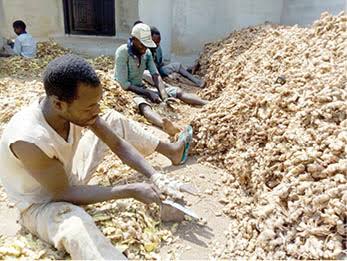News Investigators/ Ginger farmers in the south of Kaduna State have expressed concerns over the re-emergence of the fungal disease that ravaged their farms in 2023.
The News Agency of Nigeria (NAN) reports that ginger farmers in Southern Kaduna, who account for over 85 percent of Nigeria’s ginger cultivation, suffered significant losses due to the ginger blight epidemic in 2023.
The Federal Government had estimated the 2023 loss incurred by affected farmers in the area at N12 billion.
Some of the farmers who spoke to NAN on Friday expressed shock and sadness that the ginger blight had reared its ugly head again.
Israel Isaac, 44, a ginger farmer in Zangon Kataf Local Government Area, explained that his crops might have become infested due to his inability to apply the recommended chemical which, he said, is beyond his reach.
“As you can see, the leaves of my ginger have all turned yellowish, which tells you it is under attack by this disease we all thought was gone.
“My failure to apply the chemical is because it is super expensive and, like many others, I cannot afford it,” he said.
On his part, Nehemiah Jacob, a 51-year-old ginger farmer, who resides in Kafanchan, stated that the situation might affect ginger farming in Kaduna.
“A lot of us are starting to consider cultivating alternative crops because of this disease that has refused to go away.
“Also, by the time people begin to switch to other crops, it’s going to affect our position as a leading global ginger producer,” he added.
He called on government at all levels to subsidise the chemicals for ginger so that farmers could afford them and avoid a repeat of the losses incurred in 2023.
Maijama Kure, National President, Organic Ginger Farmers Association, was of the opinion that the application of the recommended chemical does not exterminate the disease completely.
“I think the remedy we currently have only suppresses and delays the disease without eliminating it entirely.
“I know of people who have made up to 10 applications this year and yet their crops are yellowish,” he stated.
According to Kure, more efforts should be geared toward understanding the root cause of the disease and finding a permanent solution.
Ibrahim Sodangi, a Professor of Crop Production at the Kaduna State University, noted that the ginger blight was resurfacing mainly on farms where the recommended chemical was not being applied.
“I tried out an experiment on my own farm and found that the part where I applied chemical was not affected at all.
“It was the portion I did not apply anything that was lost to the blight infestation.
“People are not applying the chemicals because they are not readily available, and even when you find them, they are very expensive,” he stated.
Sodangi added his voice to calls for government to step in and make the chemicals available to farmers at a subsidised rate.
He enjoined farmers to adhere to agronomy best practices to reduce the risk of undesirable outcomes on their farms.
NAN


